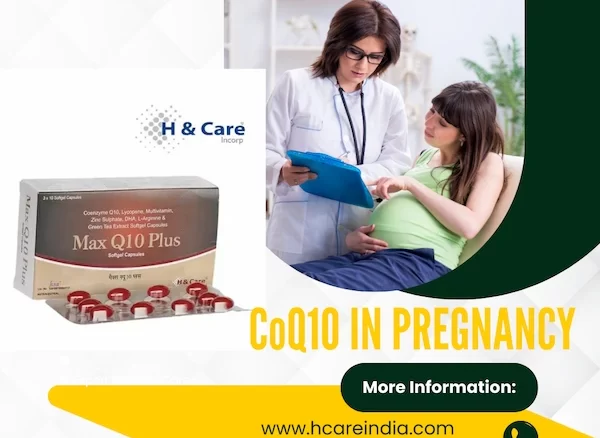CoQ10 and Fertility
While CoQ10, also known as coenzyme Q10, has no direct scientific evidence in the prevention of miscarriage, but some studies suggest that it may have potential benefits in reproductive health, lowering the risk of miscarriage. Its antioxidant properties, ability to improve egg quality by supporting cellular energy production, protecting against oxidative stress and promoting healthy blood flow by improving endothelial function and improving uterine environment, make it a valuable addition to a prenatal regimen, enhancing fertility outcomes and decrease the likelihood of miscarriage.
Coenzyme Q10 is a naturally occurring enzyme found in every cell of our body. It plays a vital role in cellular energy production and acts as a powerful antioxidant, protecting our cells from damage caused by harmful free radicals.
Miscarriage, also known as spontaneous abortion, is the loss of a pregnancy before the 20th week. It is a heartbreaking experience for couples trying to conceive, and it affects approximately 10-20% of pregnancies. Miscarriage can occur due to various factors, including genetic abnormalities, hormonal imbalances, uterine abnormalities, autoimmune disorders and lifestyle factors such as smoking and excessive alcohol consumption.
Many studies have shown a correlation between CoQ10 levels and fertility rate. As we age, our CoQ10 levels naturally decline, which can adversely affect egg and sperm quality. In women, diminished CoQ10 levels can lead to decreased ovarian reserve and lower egg quality, making it more challenging to conceive. CoQ10 also supports healthy blood flow by improving endothelial function, which is crucial for proper implantation of the embryo in the uterus. Additionally, CoQ10 enhances the health of the uterine lining, promoting a favorable environment for implantation and early embryonic development. In men, reduced CoQ10 levels have been linked to decreased sperm motility and sperm DNA damage, which can impair fertility.
Supplementing with CoQ10 can help replenish the body’s levels and improve fertility outcomes. CoQ10 supports mitochondrial function, which is essential for energy production in the cells, including the eggs and sperm. By optimizing cellular energy production, CoQ10 can enhance the quality of eggs and sperm, increasing the chances of successful conception. As an antioxidant, CoQ10 helps neutralize harmful free radicals that can damage the DNA of the developing embryo. By protecting the embryo from oxidative stress, CoQ10 help prevent genetic abnormalities that can lead to miscarriage.
A study published in the journal Fertility and Sterility found that women who took CoQ10 supplements before and during early pregnancy had a significantly lower rate of miscarriage compared to those who did not take the supplements. Another study published in the Journal of Assisted Reproduction and Genetics showed that CoQ10 supplementation improved embryo quality and increased pregnancy rates in women undergoing in vitro fertilization (IVF) treatments.
While these studies show promising results, more research is needed to establish the optimal dosage and duration of CoQ10 supplementation for preventing miscarriage.
It is important to note that CoQ10 may interact with certain medications, including blood thinners, blood pressure medications and chemotherapy drugs. If you are taking any medications, it is important to consult with your doctor before starting CoQ10 supplementation. However, it is always essential to consult with a doctor before starting any new supplement, especially during pregnancy. CoQ10 also has a range of other potential health benefits, making it a versatile supplement for overall well-being. By considering it as a potential aid in reducing the risk of miscarriage, expecting parents can take proactive steps towards a healthy pregnancy and a brighter future.
*Note: The information provided in this article is for educational purposes only and should not be considered medical advice. Always consult with a qualified healthcare professional before starting any new supplement or treatment.




